高考英语语法复习——代词
高考英语语法专题复习代词
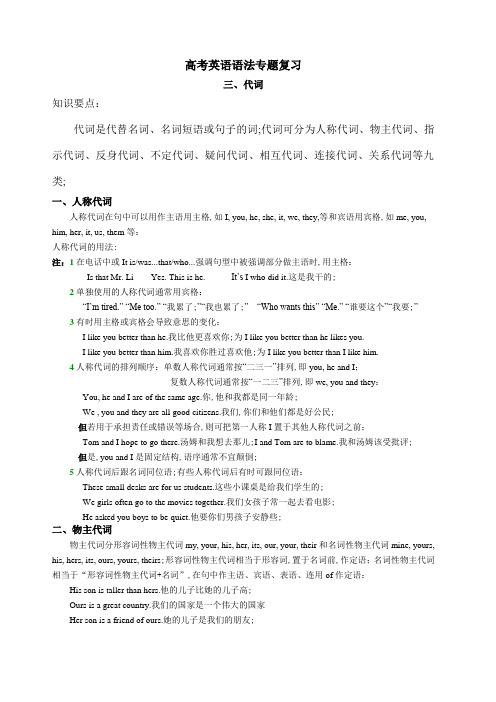
高考英语语法专题复习三、代词知识要点:代词是代替名词、名词短语或句子的词;代词可分为人称代词、物主代词、指示代词、反身代词、不定代词、疑问代词、相互代词、连接代词、关系代词等九类;一、人称代词人称代词在句中可以用作主语用主格,如I, you, he, she, it, we, they,等和宾语用宾格,如me, you, him, her, it, us, them等:人称代词的用法:注:1在电话中或It is/was...that/who...强调句型中被强调部分做主语时,用主格:---Is that Mr. Li ---Yes. This is he. It’s I who did it.这是我干的;2单独使用的人称代词通常用宾格:“I’m tired.” “Me too.” “我累了;”“我也累了;”“Who wants this” “Me.” “谁要这个”“我要;”3有时用主格或宾格会导致意思的变化:I like you better than he.我比他更喜欢你;为I like you better than he likes you.I like you better than him.我喜欢你胜过喜欢他;为I like you better than I like him.4人称代词的排列顺序:单数人称代词通常按“二三一”排列,即you, he and I;复数人称代词通常按“一二三”排列,即we, you and they:You, he and I are of the same age.你,他和我都是同一年龄;We , you and they are all good citizens.我们,你们和他们都是好公民;但若用于承担责任或错误等场合,则可把第一人称I置于其他人称代词之前:Tom and I hope to go there.汤姆和我想去那儿;I and Tom are to blame.我和汤姆该受批评;但是,you and I是固定结构,语序通常不宜颠倒;5人称代词后跟名词同位语;有些人称代词后有时可跟同位语:These small desks are for us students.这些小课桌是给我们学生的;We girls often go to the movies together.我们女孩子常一起去看电影;He asked you boys to be quiet.他要你们男孩子安静些;二、物主代词物主代词分形容词性物主代词my, your, his, her, its, our, your, their和名词性物主代词mine, yours, his, hers, its, ours, yours, theirs;形容词性物主代词相当于形容词,置于名词前,作定语;名词性物主代词相当于“形容词性物主代词+名词”,在句中作主语、宾语、表语、连用of作定语:His son is taller than hers.他的儿子比她的儿子高;Ours is a great country.我们的国家是一个伟大的国家Her son is a friend of ours.她的儿子是我们的朋友;This is your pen. Mine is in the box.这是你的铅笔,我的在铅笔盒里;注:1 a friend of mine ours, yours, hers, his, theirs结构2 物主代词与own连用;表强调;也可用of one’s own置于名词后作定语:Mind your own business.别管闲事;I saw it with my own eyes.那是我亲眼看到的;I hope to have a room of my own. / I hope to have my own house.我希望有自己的房子;三、指示代词指示代词是用来指代或标记人或事物的代词,表示“这个,这些”“那个,那些”;在句中可作主语、宾语、表语、定语;单数:this, that;复数:these, those;为了方便学习将such,so也归于此类;I like these and he likes those.我喜欢这些,他喜欢那些;What I want to say is this.我想说的就是这点;注:1 指示代词用作主语和定语时,可指人或物;用作宾语和表语时,只指物;如:This is my father. 作主语,指人Do you know this作宾语,指物,译为“你知道这个情况吗2 刚提到的或已经完成的事情时用that,但是若要指下文将要发生或将要提到的事情通常用this:She married Jim, and that surprised me.她嫁给了吉姆,这使我感到很吃惊;I want to know this: Is he healthy我想知道这一点:他是否很健康;3 在打电话时,通常用this指自己,用that指对方:Hello. This is Jim. Is that John喂,我是吉姆,你是约翰吗4 such指代前面所述的这样的人或事;如:Such is Albert Einstein, a famous physicist, but a simple man. 这就是艾尔伯特,爱因斯坦,......5 so代替一个句子或短语表达的事情;a.在believe,expect,suppose,imagine,think等词后用so代替前文观点;表肯定、否定=not均可;b. 用于表示肯定的hope,I’m afraid后,代替前文提出的观点;四、反身代词反身代词是oneself根据所指词的人称、性别、单复数等变化的词单数:myself, yourself,himself, herself, itself, 复数:ourselves, yourselves, themselves,在句中可作宾语、表语、同位语,不能作主语; 注:1用作同位语加强被修饰词的语气,紧放在被修饰名词后,或句末:The box itself is not so heavy.箱子本身并不重;You yourself said so. / You said so yourself.你自己是这样说的;2用作宾语动词或for,of, in, by, to等介词的宾语:She could not make herself understood.她不能使别人听懂她的话;You’ll have to see if he has come for yourself. for one self 亲自,为自己The computer may shut off of itself. of oneself 自动的You shouldn’t leave the child at home by herself. b y oneself 独自,单独Jim isn’t bad in himself, but he likes playing tricks on others. in one self 本身He likes a table to himself. to oneself 独自占用3 用作表语:有时用于be, feel, seem, look等后作表语表示身体或精神处于正常状态:The poor boy was myself.那个可怜的孩子就是我自己;The ones who really want it are ourselves.真正想要它的是我们自己;I'm not quite myself these days.我近来身体不大舒服;I'll be myself again in no time.我过一会儿就会好的;4 含有反身代词的动词短语:devote oneself to=be devoted to 专心于;lose oneself=be lost in 迷失;seat oneself= be seated 坐下; express oneself 表达某人的思想; say for oneself 为自己找借口;say to oneself 心想; talkto oneself 自言自语; feel oneself 觉得正常; come to oneself 苏醒;五、疑问代词疑问代词包括who, whom, whose,which, what,在句中可用作主语、表语、宾语、定语等:1、who与whom的用法:前者为主格,用作主语、宾语,后者为宾格,用作宾语;Who spoke at the meeting Whom are you talking about口语中或作宾语的whom位于句首时,通常可用who代替,但whom前有介词时除外:Whom is the letter from2、whose的用法:表示“谁的”,既可用于名词前作定语,也可单独使用;在句中作主、宾、表、定语;Whose is better, yours or hers作主语Whose do you love better, yours or hers作宾语Tom has already taken his bag is this作表语Whose bag do you like作定语3、what和which的用法:有选择范围时,多用which;无选择范围或不明确时,多用what;拓展:what的习惯用法:1 What...for... 和What for 用于询问原因和目的;---What did you put it into the soup for --- It would improve the taste.你为什么...---I’m going to the grocery store. ---What for We still have enough food in the apartment.为何啊(2)What if...表示假设、建议、征求意见或疑虑;What if it rains while we are on the way(3)What do you mean by...表示愤怒、不满等情绪;What do you mean by shutting the door so loudly(4)What/How about...用于征求对方意见、询问对方的情况;(5)疑问词what构成的固定搭配;So what那又怎么样呢表示不感兴趣或认为不重要What next店员用语还要什么Guess what你猜怎么着用于引起他人的注意What can I do for you你要买借什么4、what和who的区别:一般来说;what问职业、地位等,who问姓名或关系等:Who is he他是谁What is he他是干什么的六、相互代词相互代词只有each other和one another,它们在句中通常只用作宾语:We should help each other.我们应该互相帮助;They respect one another.他们互相尊重对方;The sea and the sky seem to melt into each other.大海和蓝天似乎融为一体;注:1相互代词在句中通常只用作宾语,不可作主语,所以以相互代词为宾语的句子不能变为被动语态;2不要将相互代词误认为是副词,将其用作状语,如可说talk to each other,但不能说talk each other;3相互代词可以有所有格形式:The students borrowed each other's notes.学生们互相借笔记;4有时可分开用:We each know what the other thinks.我们都知道对方的想法;七、不定代词1.不定代词概说;英语的不定代词有all, each, both, either, neither, one, none, little, few, many, much, other, another, some, any, no,few,little, both, enough, every等,以及由some, any, no和every构成的合成代词即somebody, anyone, nothing等;在这些不定代词中,多数都能作主语、宾语、表语或定语,但是代词none以及由some, any, no和every构成的合成代词只能作主语、宾语或表语,不能作定语,而no和every则只用作定语;2.指两者和三者的不定代词;有些不定代词用于指两者如both, either, neither,有的不定代词用于指三者如all, any, none, every,注意不要弄混:Both of my parents are doctors.我的父母都是医生;All of the students are interested in it.所有的学生对此都很感兴趣;There are trees on any side of the square.广场的每一边都种有树;He has two sons, neither of whom is rich.他有两个儿子,都不富有;He has three sons, none of whom is rich.他有三个儿子,都不富有;注:each可用于两者、三者或三者以上,而every只用于三者或三者以上,因此用于两者时只能用each,不能用every;如不能说There are trees on every side of the road.3.复合不定代词的用法特点;复合不定代词包括something, somebody, someone, anything, anybody, anyone, nothing, nobody, no one, everything, everybody, everyone等;它们在句中可用作主语、宾语或表语,但不能用作定语;something, someone等和anything, anyone等的区别与some和any的区别一样,前者一般用于肯定句,后者一般用于否定句、疑问句或条件句参见any & some;具体使用时应注意以下几点:1复合不定代词受定语修饰时,定语应放在它们后面:There is nothing wrong with the radio.这收音机没有毛病;Have you seen anyone anybody famous你见过名人吗2指人的复合不定代词若用作主语,其谓语动词一般用单数,相应的人称代词和物主代词也用单数he, him, his 不一定指男性;但在非正式文体中常用复数代词they, them, their:Everyone knows this, doesn't he don't they人人都知道这一点,不是吗If anybody anyone comes, ask him them to wait.要是有人来,让他等着;3指事物的复合不定代词若用作主语,谓语动词只能用单数,相应的人称代词也只能用it,而不用they:Everything is ready, isn't it一切都准备好了,是吗4anyone, everyone等只能指人,不能指物,且其后一般不接of短语;若是指物或后接of短语,可用any one, every one 分开写:any one of the boys books孩子们书当中的任何一个本every one of the students schools每一个学生一所学校4.是any not还是not any;按英语习惯,any以及含有any的复合不定代词用于否定句时,它只能出现在否定词之后,而不能在否定词之前:误:Any one doesn't know how to do it.正:No one knows how to do it.任何人都不知道如何做它;误:Anybody Anyone cannot do it.正:Nobody No one can do it.这事谁也干不了;误:Anything cannot prevent me from going.正:Nothing can prevent me from going.什么也不能阻挡我去;5.不定代词与部分否定;不定代词all, both, every等与not连用时构成部分否定;若要表示完全否定,则需换用none, neither, no one等;比较:All of the students like the novel.所有这些学生都喜欢这本小说;Not all of the students like the novel.并不是所有这些学生都喜欢这本小说;All of the students don’t like the novel.并不是所有这些学生都喜欢这本小说;None of the students like the novel.这些学生当中没有一个喜欢这本小说;6.all, both, each等用作同位语;若用作主语同位语,主语可以是名词或代词;若用作宾语等其他成分的同位语,则宾语等成分必须是人称代词,而不能是名词:We have all read it.我们都读过他;all修饰的主语是代词The villages have all been destroyed.村庄都被毁了;all修饰的主语是名词They told us all to wait there.他叫我们都在那儿等;all修饰的宾语是代词但不能说:They told the men all to wait there. all修饰的宾语是名词不是代词7.so little与such little的区别;用so little还是such little取决于little的意思:若表示数量方面的“少”,则用so little;若表示形状体积的“小”,则用such little:He has so little time for reading.他读书的时间少得可怜;I've never seen such little boxes.我从未见过那样小的盒子;8.some与any的用法区别;一般说来,some用于肯定句中,any用于否定句和疑问句中;但是,在表示请求、邀请或征求意见的句子中,通常要用some而不用any:Would you like some cake吃点蛋糕吗Why not buy some bread为什么不买些面包呢Shall I get some chalk for you要我帮你拿些粉笔来吗注:any有时也用于肯定句中,此时表示“任何”:Any colour will do.任何颜色都行;Come any day you like.随便哪天来都可以;9.many与much的用法区别;两者都表示“许多”,但many修饰或代替可数名词复数,与few少数相对;而much用来修饰或代替不可数名词单数,与little少量相对;在口语中两者主要用于非肯定句中:Did you see many people there你在那儿看见许多人了吗We don't have much time.我们没有许多时间;在肯定句中,一般用a lot of, lots of, plenty of等代之;但在正式文体中有时也用于肯定句中;另外,若用作主语或主语的定语,或其前有how, too, as, so, a good, a great等修饰,也可用于肯定句中:Many of us left early.我们有许多人离开得很早;Much work has been done.许多工作都已经做了;You've given me too much.你已给我太多了;Take as many much as you want.你要多少拿多少;I asked her a great many questions.我问了她许多问题;10.few, a few与little, a little的用法区别;1few和a few后接可数名词的复数形式;few表示数量很少或几乎没有,强调“少”,含有否定意义;a few表示数量虽然少但毕竟还有,强调“有”,含有肯定意义:It is very difficult, and few people understand it.它很难,没有几个人能懂;It is very difficult, but a few people understand it.他虽难,但是有些人懂;2little和a little之后接不可数名词,其区别跟few和a few之间的区别相似:Unfortunately, I had little money on me.很不巧,我身上没带什么钱;Fortunately, I had a little money on me.幸好我身上带着一点钱;11.other, the other, another与others的用法区别:这些不定代词不仅在含义上有单复数之分,而且在用法上有泛指无the和特指有the之别;其用法区别可归纳如下:1指单数时,若泛指用another,若特指用the other:Give me another one.另外给我一个;Shut the other eye, please.请把另一只眼睛也闭上;2指复数时,若泛指用other后接复数名词,若特指用the other后接复数名词:There are other ways of doing it.做这事还有其他的办法;Where have the other students gone其他学生都到哪里去了3others永远表示复数意义且其后不能再接名词;其用法大致相当于“other+复数名词”,同样地the others大致相当于“the other+复数名词”:Other people Others may not think that way.别的人可能不这样想;He is cleverer than the others the other students in her class.他比班上其他学生聪明;4another一般只能表单数,且其后接名词也只能接单数名词;但是若其后有数词或few修饰时,则也可接复数名词:We need another few chairs.我们还需要几把椅子;In another two weeks it'll be finished.再过两个星期就可做完了;5与some对比使用时,用others此时与some同义:Some say yes, and others say no.有人说对,有人说不对;12.不定代词与语境考题;不定代词是高考的常考考点,有的不定代词考题出得比较灵活,不能死套规则,要注意结合语境来理解:1“Is ____ here” “No, Bob and Tim have asked for leave.”A. anybodyB. everybodyC. somebodyD. nobody若只是从表面来看,填空句是个疑问句,可能会误选A;但其实此题最佳答案应选B,因为下文的答句说“只有Bob和Tim请假了”,这说明问句是在查人数,故用Is everybody here 大家都到齐了吗2I agree with most of what you said, but I don't agree with _____.A. everythingB. anythingC. somethingD. nothing此句若从表面看,有可能误选B,因为填空句为否定句;但实际上最佳答案为A,因为上文说“我同意他说的大部分内容”,这与下文的but I don’t agree with everything但并不是同意他说的所有内容完全相符;3“Do you have _____ at home now, Mary” “No, we still have to get some fruit and tea.”A. somethingB. anythingC. everythingD. nothing答案选C,句意为“玛丽,现在家里东西都准备齐了吗”“还没有,我们还要买些水果和茶;”4“If you want a necklace, I’ll buy one for you at once.” “Oh, no. A necklace is not _____ that I need most. A. anythingB. somethingC. nothingD. everything此题容易误选A,机械地认为:something用于肯定句,anything用于否定句或疑问句;但是,此题的最佳答案是B,something在此的意思不是“某种东西”,而是指“那种东西”或“这种东西”,即心中最想要的那种东西相当于the thing;。
高考英语语法专攻-《代词》-考点归纳+针对性练习
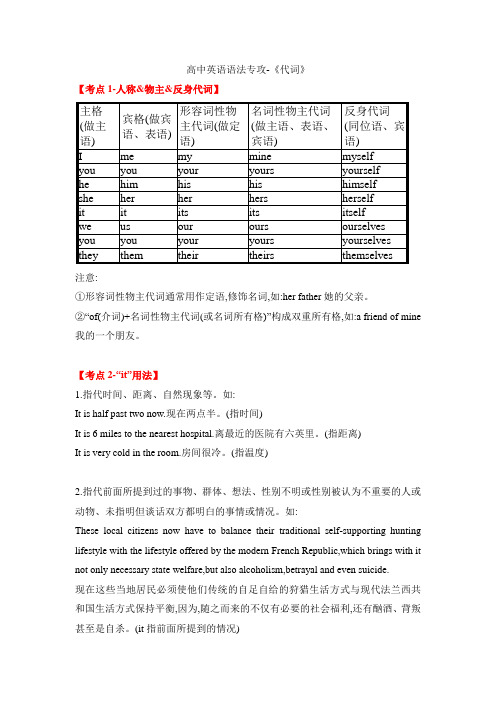
高中英语语法专攻-《代词》【考点1-人称&物主&反身代词】注意:①形容词性物主代词通常用作定语,修饰名词,如:her father她的父亲。
②“of(介词)+名词性物主代词(或名词所有格)”构成双重所有格,如:a friend of mine 我的一个朋友。
【考点2-“it”用法】1.指代时间、距离、自然现象等。
如:It is half past two now.现在两点半。
(指时间)It is 6 miles to the nearest hospital.离最近的医院有六英里。
(指距离)It is very cold in the room.房间很冷。
(指温度)2.指代前面所提到过的事物、群体、想法、性别不明或性别被认为不重要的人或动物、未指明但谈话双方都明白的事情或情况。
如:These local citizens now have to balance their traditional self-supporting hunting lifestyle with the lifestyle offered by the modern French Republic,which brings with it not only necessary state welfare,but also alcoholism,betrayal and even suicide.现在这些当地居民必须使他们传统的自足自给的狩猎生活方式与现代法兰西共和国生活方式保持平衡,因为,随之而来的不仅有必要的社会福利,还有酗酒、背叛甚至是自杀。
(it指前面所提到的情况)—Who’s that at the door?—It is the milkman.——门口那人是谁?——是送奶工。
(it指代性别不明或性别被认为不重要的人)—I’ve broken a plate.我打碎了一个盘子。
—It(=Breaking the plate) doesn’t matter.没关系。
高考英语代词知识点总结

高考英语代词知识点总结在高考英语中,代词是一个非常重要的语法知识点。
代词在句子中可以替代名词,起到简化句子结构、避免重复的作用。
本文将从不同角度总结高考英语中的代词知识点。
一、人称代词人称代词是用来代替人的名词的词语。
在高考英语中,常见的人称代词有I、you、he、she、we、they等。
在使用人称代词时需要注意其主格和宾格的区别。
主格用于做主语或表语,而宾格则用于做动词或介词的宾语。
例如:I am a student. (主格)She is taller than me. (宾格)除了区分主格和宾格之外,人称代词还有复数形式。
例如:we代表“我们”,they代表“他们”。
二、物主代词物主代词用来表示所属关系,包括形容词性物主代词和名词性物主代词。
形容词性物主代词位于名词前面修饰名词,而名词性物主代词则作为名词的替代词使用。
例如:This is my book. (形容词性物主代词)The red one is mine. (名词性物主代词)在使用物主代词时,需要根据名词的单复数和所有格进行变化。
例如,单数名词后加's,复数名词只加'。
三、反身代词反身代词用来指示动作的承受者与动作的发出者是同一个人。
常见的反身代词有myself、yourself、himself、herself、ourselves、themselves等。
例如:He hurt himself while playing football. (他在踢足球时受伤了)另外,反身代词可以用来强调主语:I myself will finish the task. (我自己会完成这个任务)四、指示代词指示代词用来指示人或物的位置、距离和数量等信息。
常用的指示代词有this、that、these、those等。
例如:This is my bag. (这是我的包)Those are my friends. (那些是我的朋友)指示代词还可以与名词连用来修饰名词,表示特指。
高考英语语法代词详解
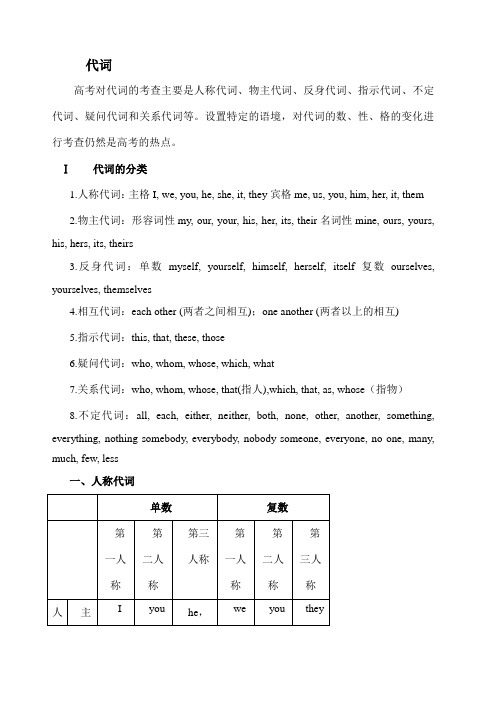
代词高考对代词的考查主要是人称代词、物主代词、反身代词、指示代词、不定代词、疑问代词和关系代词等。
设置特定的语境,对代词的数、性、格的变化进行考查仍然是高考的热点。
Ⅰ代词的分类1.人称代词:主格I, we, you, he, she, it, they宾格me, us, you, him, her, it, them2.物主代词:形容词性my, our, your, his, her, its, their名词性mine, ours, yours, his, hers, its, theirs3.反身代词:单数myself, yourself, himself, herself, itself复数ourselves, yourselves, themselves4.相互代词:each other (两者之间相互);one another (两者以上的相互)5.指示代词:this, that, these, those6.疑问代词:who, whom, whose, which, what7.关系代词:who, whom, whose, that(指人),which, that, as, whose (指物)8.不定代词:all, each, either, neither, both, none, other, another, something, everything, nothing somebody, everybody, nobody someone, everyone, no one, many, much, few, less一、人称代词单数复数第一人称第二人称第三人称第一人称第二人称第三人称人主I you he,we you they称代词格she,it宾格me you him,her,itus you them人称代词的用法1.人称代词的主格在句子中作主语或主语补足语。
如:John waited a while but eventually he went home.约翰等了一会儿,最后他回家了。
自己高考英语语法专项复习——代词

4. Many will fail to find jobs or lose the ones(=the jobs) they have.许多人 将找不到工作, 或者失去现有的工作。
归纳总结
1. it和that都替代“the+单数名词”, 都是 特指, 都可替代可数和不可数名词; 但 it___ 指前面提到的“同名同物”that , 而_____是指 前面提到的“同类” 事物。 2. _____ one 替代“a+单数可数名词”, 表示 泛指; 其复数形式 _____替代泛指的复数名 ones 词。
the other two are from New York.
在那三个外国客人中,一个来自伦敦,另外两
个来自纽约。
8.He’ll stay here for another two days
(=two other days).他要在这里再呆两天。
1.完成下列表格
都 两者 both 都不 ⑵ neither _______ 任一 ⑷ either _____
yours his hers 无 theirs
yourself
yourselves himself herself itself themselves
第三 人称
复 数 they them
3
指示代词,相互代词及疑问代词分
别包含哪些词? 1.指示代词:this, that,these,those 2.相互代词:each other, one another 3.疑问代词: who, which, whom, whose, what 故暂不考虑其类型。
全部(的) 两个都 每个
具体数量意 义 或是否可数 三个或以上 或 不可数
两个 两个或以上
高考英语语法专项复习——代词

7) He doesn’t know how to express himself _____ in English. 8) With money in hand,the happy children went to buy ________ themselves some ice cream. 9) Mind you don’t hurt yourself ______with those scissors. 10)Life is not easy. One should enjoy oneself himself at times. _______/_______ 11) Listen! Someone has lockedthemselves _______ / ________ himself in the room. 12) “DIY” means “do it ________.” yourself
泛指 特指
单数 one (a+单数可数名词) the one=that (the+单数可数名词)
复数 ones (复数名词) the ones=those (the+复数名词)
注:口语中,特别是当后面有of短语时,多用that或 those;当有前置修饰语时,只能用one(s)。
His bag is newer than that of mine/me I like the red one.
6) Which one is right? Sometimes we teachers hardly know what you are thinking and doing. Sometimes our teachers hardly know what you are thinking and doing. 7) (07高考) …We thanked her for all the her trouble we had caused ____.
高考英语复习高中英语语法知识点总结代词
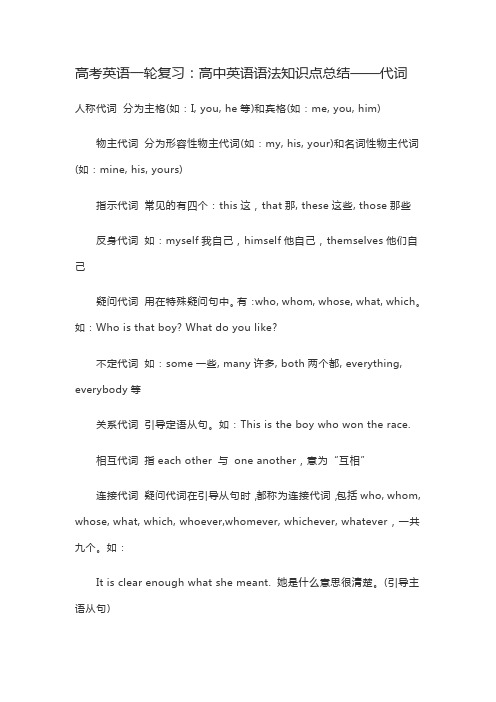
高考英语一轮复习:高中英语语法知识点总结——代词人称代词分为主格(如:I, you, he等)和宾格(如:me, you, him) 物主代词分为形容性物主代词(如:my, his, your)和名词性物主代词(如:mine, his, yours)指示代词常见的有四个:this这,that那, these这些, those那些反身代词如:myself我自己,himself他自己,themselves他们自己疑问代词用在特殊疑问句中。
有:who, whom, whose, what, which。
如:Who is that boy? What do you like?不定代词如:some一些, many许多, both两个都, everything, everybody等关系代词引导定语从句。
如:This is the boy who won the race.相互代词指each other 与one another,意为“互相”连接代词疑问代词在引导从句时,都称为连接代词,包括who, whom, whose, what, which, whoever,whomever, whichever, whatever,一共九个。
如:It is clear enough what she meant. 她是什么意思很清楚。
(引导主语从句)I don’t care what they think. 他们怎么想我不管。
(引导宾语从句)第1讲人称代词第2讲指示代词人称代词分为主格和宾格。
考点1. 代词作同位语如果代词和名词指代相同时,常用主格或宾格作同位语,不用物主代词。
改错:Our Chinese people are friendly.把our改为we, 因为我们本身就是中国人。
考点2. 用人称代词宾格代替主格的情况①口语中作表语的人称代词一般用宾格,不用主格。
—Who is it? —It’s me.②在比较句型中,as和than后的主格可以用宾格代替。
高三英语语法复习(代词)

• other, others, the other, the others, another
• other表示泛指,常与复数名词或不可数名词连用; others表示泛指,相当于“other + 复数名词” • “the other+单数可数名词”特指两者中的另一 个,常有“one ...the other ...”一个„„另 一个„„的搭配 • 其复数形式the others或“the other +复数名 词”特指在某些人或物中,除去一部分后,“其 余的”或“剩下的”人或物 • another常用于三者或三者以上中的“另一个”, 表示泛指,后接单数名词,也可用于“another+ 数词+名词复数”。
名词性
反(自)身代词
mine
myself
yours
yourself
his, her, its
himself, herself, itself
ours
ourselves
yours
yourselves
theirs
themselves
指示代词
this, that
these. those
相互代词
不定代词
宾格
4. both…and…表示 “ 和……两个都” ,连接主语时谓语动
词是复数; either…or…表示“或……或”,neither…nor… 表示“既不……也不”;连接两个并列主语时谓语动词采用 就近原则,如: 1) Both Zhang and Wang are good students. 张、王都是好学生。 2) Either you or he is right. 不是你就是他对的。 3) Neither he nor I am a scientist. 他和我都不是科学家。
高中英语语法——代词的用法

来代替“形容词性物主代词+名词”的形式。 如:My bag is yellow, her bag is red, his bag is blue
2) 名词性物主代词的句法功能 a. 作主语 如: May I use your pen? Yours works better. b. 作宾语 如:I love my motherland as much as you love
yours. 我爱我的祖国就像你爱你的祖国一样深。 c. 作介词宾语
His cap 意为 The cap is his.
D) 可以说 a friend of mine (ours, yours, hers, his, theirs),=one of my friends;但是不能说 a friend of me (us, you, her, him, them)。
这三种代词都有人称(一、二、三人称) 的变化、数(单、复数)的变化,以及性 (阴性、阳性、中性)的变化。其中,人 称代词除了这三种变化外,还有格(主格、 宾格)的变化。
物主代词又包括两种形式:形容词性物主 代词和名词性物主代词。
特别注意:形容词性物主代词its没有相应 的名词性物主代词。
这三种代词的形式变化表如下
人称 单复数 主 格
宾格
形容词性 名词性 物主代词 物主代词
反身代词
第一 单 数
I
me
人称 复 数
we
us
第二 单 数
高考英语语法考点代词

高考英语语法考点代词I. 代词可以分为以下八大类1 人称代词 主格I, you, he, she, it, we, you, they 宾格me, you, him, her, it, us, you, them 形容词性物主代词 my, your, his, her, its, our, their名词性物主代词 mine, yours, his, hers, its, ours, theirs2反身代词 myself, yourself, himself, herself, itself, ourselves, yourselves, themselves 3指示代词 this, that, these, those, such, some 4疑问代词 who, whom, whose, which, what, whoever, whichever, whatever 5 关系代词/连接代词 that, which, who, whom, whose, as6 不定代词 one/ some/ any, each/ every, none/ no, many/ much, few/ little/ afew/ a littleother/ another, all/ both, neither/ either7 相互代词 each other,one anotherII. 不定代词用法注意点类别 区 别 例 句one, some , any 和itone 可以泛指人或者事(东西),其复数为ones ①We’ve been looking at the houses but haven’t found ___we like yet.A.oneB.onesC.itD.them②Cars do cause us some health problems — in fact far moreserious _______ than mobile phones do.A.oneB.onesC.itD.thosesome 可用于疑问句中,表示盼望得到肯定的答复,或者表示建议,请求等 —Your coffee smells great! —It’s from Mexico.Would youlike ________? A.it B.some C.this D.1ittle some 和any 修饰可数名词单数时,some 表示某个,any 表示任何一个 ①I have read this article in some magazine. Please correctthe mistakes, if any. ②—Which of the three ways shall I take to the village?—________way as you please.A.EachB.EveryC.AnyD.Eitherone 指同类中的一个,it 指代同一种类的东西。
超实用高考英语复习语法专题:代词

7 one, it与that用法上有何区别?
用one, it或that填空 1. A desk made of wood lasts longer than ___o_n_e_____ made of plastics. 2. This news is less exciting than ___t_h_a_t ____. 3. There is only one dictionary left in the bookstore. Please go to buy_____i_t____.
8
如何区别each, every, both, all, either, neither, none的用法?
选用上述不定代词填空,体会其含义
1. Look! __E_a_c_h_/E_i_th_e_r of his hands is covered with muddy.What a naughty boy!
一、代词
1 什么是代词, 代词有哪些种类?
指出下列句子中画线代词的名称 1. Mr.Bean is humorous. He is popular all over the world. 憨豆先生很幽默,他在全世界受欢迎。 【答案】 人称代词 2. Let's get down to our business. 让我们言归正传吧。 【答案】 物主代词
7
1. one, it,that三者均为代词; 2. one只能代可数名词单数,表示泛指,其复 数形式为ones; 3. that既可以代可数名词又可以代不可数名词, 强调与this的对应性。代可数名词时,其复数形式为 those;
7
4. it有明显的特指性,确定性,指代上文提到 的具体事物, 既可以代可数名词又可以代不可数名 词,代可数名词时,其复数形式为they/them。
代词知识点
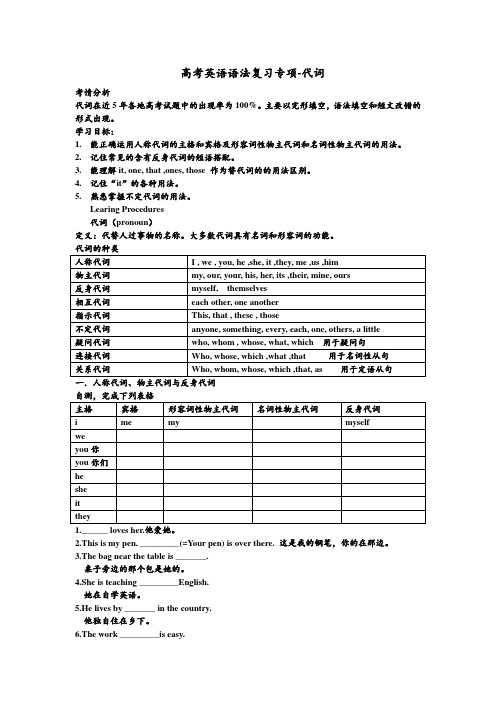
高考英语语法复习专项-代词考情分析代词在近5年各地高考试题中的出现率为100%。
主要以完形填空,语法填空和短文改错的形式出现。
学习目标:1.能正确运用人称代词的主格和宾格及形容词性物主代词和名词性物主代词的用法。
2.记住常见的含有反身代词的短语搭配。
3.能理解it, one, that ,ones, those 作为替代词的的用法区别。
4.记住“it”的各种用法。
5.熟悉掌握不定代词的用法。
Learing Procedures代词(pronoun)定义:代替人过事物的名称。
大多数代词具有名词和形容词的功能。
一.人称代词、物主代词与反身代词2.This is my pen. _________(=Your pen) is over there. 这是我的钢笔,你的在那边。
3.The bag near the table is _______.桌子旁边的那个包是她的。
4.She is teaching _________English.她在自学英语。
5.He lives by _______ in the country.他独自住在乡下。
6.The work _________is easy.这工作本身很容易。
归纳总结⑴人称代词有主格和宾格之分, 主格在句中作主语(如She), 宾格在句中作宾语(如him)。
⑵物主代词有形容词性和名词性两种, 形容词性物主代词只能在名词前作定语(如your);名词性物主代词在句中可作主语(如mine)、宾语和表语(如his)等。
⑶反身代词可作动词或介词(by, for等)的宾语; 或者作主语或宾语的同位语,起加强语气的作用, 译作“亲自, 本人”。
注意: 反身代词不能单独作主语。
用所给代词的适当形式填空1. This is not my pencil-box. ______ ( I ) is in the bag.2. Help ______ (you) to some fruit, Jack.3. Their English teacher is from America, but ______ (we) is from England.4. Did you enjoy _______ (you), Mary and Kate?请补充下列常见的反身代词词组短语1._____________ oneself 自学2. ______ oneself 单独,独自3._____________onesef 自言自语4.___________ oneself 玩得愉快5._____________oneself 自称6. ________oneself to 随便吃7.____________ oneself 自己穿衣8__________ to oneself 苏醒9. ____________oneself 自称10.__________oneself 找个位置坐下11.____________oneself to 致力于12._________oneself 举止规矩二.指示代词. this, that (单数)that. those( 复数)1.this(these 指代时间或空间较近的人或物。
高三英语语法复习教案:代词2篇

高三英语语法复习教案:代词高三英语语法复习教案:代词精选2篇(一)教案:高三英语语法复习-代词时间:一节课(45分钟)教学目标:1. 理解代词的定义和作用;2. 掌握不同类型的代词的用法;3. 能够正确使用代词进行句子的构建。
教学准备:1. PowerPoint演示文稿;2. 教科书和课堂练习题。
教学过程:步骤一:引入(5分钟)1. 通过演示文稿展示一些句子,并强调其中的代词;2. 向学生解释代词的作用和作用范围;3. 引导学生讨论代词的使用场景和其重要性。
步骤二:概念讲解(10分钟)1. 向学生介绍不同类型的代词,包括人称代词、物主代词、反身代词、指示代词、相互代词等;2. 使用演示文稿中的句子来示范不同类型的代词的使用;3. 解释每个类型的代词的定义和用法。
步骤三:例句讲解(15分钟)1. 展示几个不同类型的代词的句子,并解释其用法;2. 通过练习题让学生找出代词,并解答问题;3. 引导学生思考代词的用法和其中的语法规则。
步骤四:练习(10分钟)1. 分发练习题,并让学生自行完成;2. 讲解答案和解释代词的使用规则。
步骤五:总结(5分钟)1. 向学生总结本节课所学的代词的知识点;2. 强调代词在句子中的重要性和正确的使用方法;3. 鼓励学生继续进行更多的代词练习。
教学延伸:1. 为了加强学生对代词的理解和应用能力,可以在课后布置更多的代词练习题;2. 可以分组进行代词练习对抗赛,增加学生的参与度和激发学习兴趣;3. 鼓励学生在阅读中注意代词的使用,提高对代词的灵活应用能力。
教学评估:1. 通过课堂练习题对学生进行实时评估;2. 老师对学生的课堂活动参与度和对问题的回答进行评估;3. 对学生进行小结和问答,测试学生对代词的掌握程度。
高三英语语法复习教案:代词精选2篇(二)教学目标:1. 通过复习特殊词的用法,巩固学生对英语语法知识的掌握。
2. 帮助学生理解特殊词在句子中的作用,并能正确运用。
3. 提高学生的语言表达能力和语法运用能力。
英语语法——代词

him
his
his
himself
阴性
she
her
her
hers
herself
中性或非人称
it
it
its
its
itself
复数
中性
they
them
their
theirs
themselves
功用
主语、表语、主补
宾语、表语、介宾
宾语
主语、宾语、表语、介宾
宾语、介宾、表语、同位语
3.指示代词(Demonstrative Pronouns)
主语、宾语、表语、介宾,可单独使用
反身代词
ReflexivePronouns
人身代词+self构成
宾语、表语、介宾、同位语
相互代词
ReciprocalPronouns
指示代词
Demonstrative Pronouns
表示“这个”、“那个”、“这些”、“那些”等指示概念的代词
疑问代词
InterrogativePronouns
3.人称代词、物主代词、反身代词
类别
人称代词
物主代词
反身代词
主格
宾格
形容词性
名词性
形式
第一
人称
单数
I
me
my
mine
myself
复数
we
us
our
ours
ourselves
第二
人称
单数
you
you
your
yours
yourself
复数
you
you
your
yours
高考英语语法代词讲解

考点知识全面总结高频考点知识总结一人称代词、物主代词、反身代词和疑问代词(一)人称代词1.当说话者不清楚或不必要知道说话对象的性别时,可以用it来表示。
如:It’s a lovely baby. Is it a boy or a girl?这孩子真可爱。
是男孩还是女孩?2. 人称代词有时也可用作名词。
如:It’s not a she; it’s a he.那不是女孩是个男孩。
3. 人称代词单独使用时,一般不用主格而用宾格。
如:---Glad to meet you. 见到你我很高兴。
---Me, too. 我也是。
4. 代词they(不分性别)代表一提到过的一些人或物,在口语中还可以代替he or she。
此外,they还可泛指一般人。
如:The Browns phoned. They’re coming round this evening.布朗夫妇打电话了。
他们今天晚上到。
If anyone arrives late, they’ll have to wait outside.谁要是迟到,谁就得在外面等着。
(代替he or she)They say we’re going to have a hot summer.据说今年夏天将会很热。
(泛指一般人)(二)物主代词物主代词即人称代词的所有个形式,它可分为形容词性物主代词(my, your, his, her, its, our, theirs)和名词性物主代词(mine, yours, his, hers, its, ours, theirs)1.形容词性物主代词相当于形容词,只能作名词或动名词的定语。
如:This is our classroom. 这是我们的教室。
(作名词的定语)Would you mind my opening the window? 你介意我开窗户吗?(作动名词的定语或被称为动名词的逻辑主语)2.名词性物主代词相当于“形容词性物主代词+名词”,可单独做主语、宾语、表语;此外,名词性物主代词还可与名词及of连用,构成双重所有格,即:a/ an/ this/ these/ those/ some/ any/ several/ no/ each/ every/ such/ another/ which+名词+of+名词性物主代词。
代词 高考英语语法重点归纳
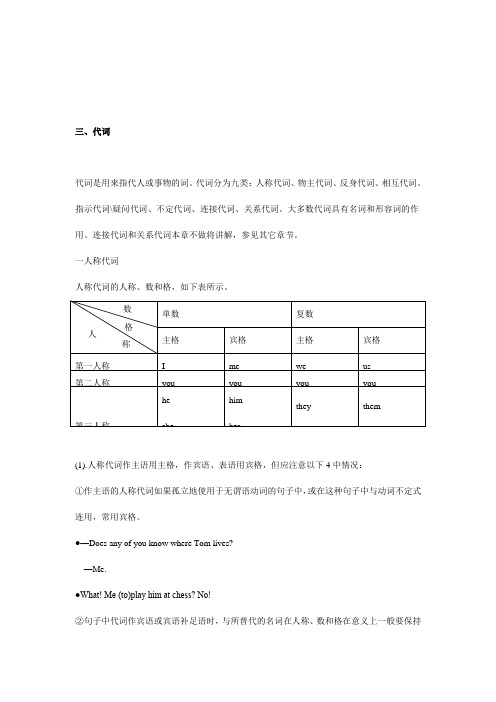
三、代词代词是用来指代人或事物的词。
代词分为九类:人称代词、物主代词、反身代词、相互代词、指示代词\疑问代词、不定代词、连接代词、关系代词。
大多数代词具有名词和形容词的作用。
连接代词和关系代词本章不做将讲解,参见其它章节。
一人称代词人称代词的人称、数和格,如下表所示。
(1).人称代词作主语用主格,作宾语、表语用宾格,但应注意以下4中情况:①作主语的人称代词如果孤立地使用于无谓语动词的句子中,或在这种句子中与动词不定式连用,常用宾格。
●—Does any of you know where Tom lives?—Me.●What! Me (to)play him at chess? No!②句子中代词作宾语或宾语补足语时,与所替代的名词在人称、数和格在意义上一般要保持前后一致。
●The thief was thought to be he.(the thief是主格,故用he代替)●They took me to be her.他们误以为我是她。
(me是宾格,故用her替代)③在比较级的句子中than、as后用主格、宾格都可以。
如:He is taller than me(I).但在下列句中有区别。
●I like Jack as much as her.=I like both Jack and her.●I like Jack as much as she.=I like Jack and she likes him, too.(2).两个以上的人称代词并列,其次序排列原则为:①在并列主语中,“I”总是放在最后,排列顺序为:二三一(人称)。
宾格me也一样。
●You ,she and I will be in charge of the case.②第三人称,男女两性并用,男先女后。
●He and she still don’t agree to the plan.(3)几个人称代词的特殊用法。
①we/you(口语)常用来泛指一般人。
高考英语复习语法知识专题讲解3---代词(解析版)
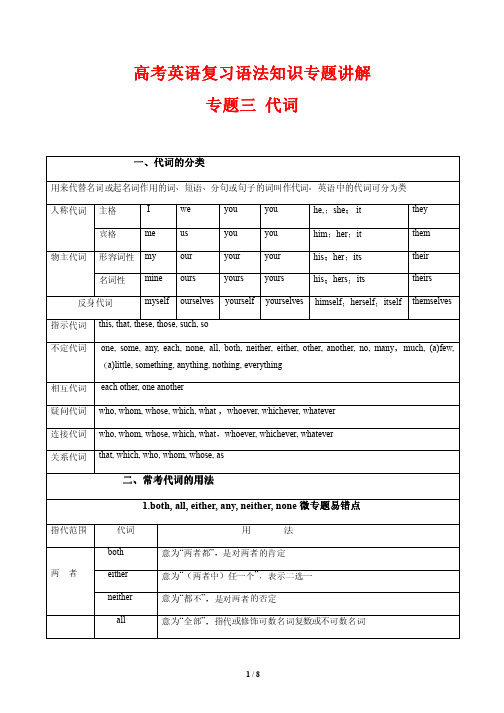
高考英语复习语法知识专题讲解专题三代词一、代词的分类用来代替名词或起名词作用的词、短语、分句或句子的词叫作代词。
英语中的代词可分为类人称代词主格 I we you you he,;she; it they 宾格me us you you him;her;it them物主代词形容词性my our your your his;her;its their 名词性mine ours yours yours his;hers;its theirs 反身代词myself ourselves yourself yourselves himself;herself;itself themselves 指示代词this, that, these, those, such, so不定代词 one, some, any, each, none, all, both, neither, either, other, another, no, many,much, (a)few,(a)little, something, anything, nothing, everything相互代词 each other, one another疑问代词who, whom, whose, which, what ,whoever, whichever, whatever连接代词who, whom, whose, which, what,whoever, whichever, whatever关系代词that, which, who, whom, whose, as二、常考代词的用法1.both, all, either, any, neither, none 微专题易错点指代范围代词用法两者both 意为“两者都”,是对两者的肯定either 意为“(两者中)任一个”,表示二选一neither 意为“都不”,是对两者的否定all 意为“全部”,指代或修饰可数名词复数或不可数名词三者或三者以上any 意为“任何一个”,指代或修饰可数名词单数或不可数名词none意为“全无,没有一点”,指代可数名词复数或不可数名词指物或人,其后可接表示范围的of...回答 how many/how much 的提问no one意为“没有人”,只指人其后不接表示范围的of...回答 who 的提问例:He is good at both English and French.You can take either of the pictures, whichever you like.It was a game in which neither team would win.Neither of us could understand German.All are happy to know the news.Phone me any day next week.We had three cats once but none(of them)is alive now.No one knows the answer.-How many of you have been to the Great Wall?-None.2.other, another 微专题易错点两者都意为“另一个”。
- 1、下载文档前请自行甄别文档内容的完整性,平台不提供额外的编辑、内容补充、找答案等附加服务。
- 2、"仅部分预览"的文档,不可在线预览部分如存在完整性等问题,可反馈申请退款(可完整预览的文档不适用该条件!)。
- 3、如文档侵犯您的权益,请联系客服反馈,我们会尽快为您处理(人工客服工作时间:9:00-18:30)。
形式主语
It not easy to learn a foreign language well. 劝他没用 It is no use trying to persuade him. 众所周知,中国人口最多 It’s well-known that China has the largest population in the world.
反身代词惯用语
(5.3第12页)for myself/of itself/in himself/to oneself/by myself/beside myself
The machine will start___ of itself in a few seconds. The money in itself meant nothing to them. ___ When I dine in a restaurant, I like a table____ to myself
This is our classroom这是我们的教室(做名 词的定语) Would you mind my opening the windows? 你介意我开窗户吗(做动名词的定语或被称 为动名词的逻辑主语) 名词性物主代词还可与名词及of连用构成双 重所有格:a/an/this/that/ These/those/some/any/no/every/each/anoth er...+名词+of+名词性物主代词 Some friends of mine will attend my party
与不定代词构成的习惯搭配 (见5.3第15页)
用None,nothing,nobody(no one)填空 ---How many people are there in the room? ---___ None ---Who is in the room? Nobody(no one) ---___ ---Is there anyone in the room? No ---___one ---Is there any person in the room? None ---___
用one/the one填空 ----Why don’t we take a little break? one ----Didn’t we just have____? Meeting my uncle after all these years was one an unforgettable moment, _______I will always treasure.
Any/every
any every Not any 任何都不 (全部否 定) Not every 并非每个 (部分否 定) 任何(3 每一个 个或以上) ( 3个或 以上)
Each/every
词性 Every 形容词 意义 功能 3个或以 定语 上中的一 个 形容词、 2个或以 主语、宾 名词 上中的一 语、同位 个 语、定语
None/nothing/nobody(no one)
None:既可指人,也可指物。特指概念。常用 于回答how many/much引导的疑问句。 Nobody(no one):只能指人,常回答who引 领的疑问句。 Nothing:只能指物,常用于回答what引导的 疑问句
(剩下的见5.3第14页)
物主代词
人称代词 I You He/She It We They
形容词性物主代词 My Your His/Her Its Our Their 名词性物主代词 Mine Yours His/Hers Its Ours Theirs
形容词性物主代词+名词 名词性物主代词 形容词性物主代词 名词=名词性物主代词 名词
It固定句型(见5.3第13页)
区别不定代词
Both/all/either/any/neither/none
都 二者 任何 都不 Neither none
both either any
三者或三者 all 以上
any Mr. Alcott refused to accept____(任何)of the three suggestions made by the student’s Union. either There are many trees on ____ side(=both sides)of the street. Neither _____(都不)of the two cars is mine. _____(所有)horses are animals, but not All _____(所有)animals are horses. all
二、it的用法
1.It’s half pass two now.(时间) 2.It’s 6 miles to the hospital.(距离) 3.It’s very cold in the room.(温度) 4.A lovely day, isn’t it?(天气) 从你家到学校有多远的路程? How far is it from your home to your school? 多美好的一天啊! What a fine day it is!
His Ⅰ ___(他的) father is an engineer. mine ⅡThat car of ___(我的) is always breaking down. yours Ⅲ His dictionary is much thicker than___ (你的) hers Ⅳ I know each brother of___(她的)
One/another/the other/some/the others
一个、一 另外一个、剩余的一个、 些 一些 一些 One Another The other Some Others The others
单数 复数
The other后只能加可数名词 The rest of后既可加可数名词,也可不可数名词
疑问代词5.3第12页
What/who/which Whatever/whoever/whichever What on earth/who on earth/which on earth How many people are there in China? ___is What the ___ population of China? How far is it from here to Beijing? What ____is the distance from here to Beijing?
While I agree with most of what you said, I don’t agree with____ C A. something B. anything C. everything D. nothing C I haven’t read____ of his books, but judging from one I have read, I think he’ll make a promising(有前途的) writer. A. any B. none C. both D. either
代词
1.人称代词、物主代词、反身代词、疑问代词 人称代词、物主代词、反身代词、 人称代词
2.it的用法 的用法
3.区别不定代词 区别不定代词
一.人称代词
1.当说话者不清楚或没必要清楚对象的性别时,可 以用It表示。 It’s a lovely baby. Is it a boy or a girl? 2.人称代词也可用作为名词。 It’s not a she; it’s a he. 3.没有谓语的句子中,人称代词常用宾格 ----Glad to meet you! ----Me, too.
Each
Each作同位语的时候,不影响谓 语动词的单复数形式(5.3第14 页)
用each/every填空 each He had a cut on ______foot. Every _____child in the class passed the exam. Each _____of the houses is slightly different. each I asked all the children and_____ told a different story.
指代前面所提到过的事情、失误、群体、想 法、性别不明或被认为不重要的人或动物、 未指明但谈话双方都明白的事情或情况。 ----I’ve broken a plate. ----It(=breaking the plate)doesn’t matter. 我们没有足够的钱,但这不是什么大问题。 We don’t have enough money, but it’s not a big problem.
He will drop in on(顺道拜访)____ day. B A. Some others B. Another C. other D. the rest
One/ones/the one/ the ones/that/those
One:前面出现过的泛指的单数名词 Ones:前面出现过的泛指的复数名词 The one:前面出现过的特指的单数名词 The ones ones:前面出现过的特制的复数名词 That:前面出现过的的特指的单数名词或不可数名 词 Those:有时可代替the ones(特别是后有后置定 语)
many/much/few/little/a few/a little
多 Many 少 Few 复数名 词 Much Little 肯定 否定
复数名 词 不可数 名词
A few
Few Little
不可数 A little 名词
用many/much/few/little/a few/a little填空 Many much _____(很多)people don’t have _____(很 多)food. Many _____(很多)of the mistakes were just caused by carelessness. Few _____(很少)people can live to be 100years. little You have done very ____(很少)for me. a little Come in and have ____(一点)whisky.
